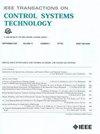Resilient Sequential Fusion on Lie Groups for Consistent Collaborative Localization
IF 3.9
2区 计算机科学
Q1 AUTOMATION & CONTROL SYSTEMS
引用次数: 0
Abstract
Collaborative localization (CL) in multiagent systems has become an increasingly prominent research area, particularly under an uncertain and partially connected dynamic communication environment. This article presents a CL framework based on a resilient sequential fusion approach that guarantees consistency in matrix Lie groups. The proposed method is inherited from the pipeline of the distribution Kalman filter, which utilizes invariant error defined on a manifold to establish the global state propagation and update process for estimating the pose of all agents in the predefined reference frame. Furthermore, the communication update process is treated separately by generalizing the covariance intersection (CI) fusion into the designed geometric group structure, enabling flexible updates while maintaining the consistency of estimates and ensuring the independence of the filter update process. Specifically, to address the potential issues in agents’ communication, a weighted fusion criterion with an analytical form is proposed, allowing communication fusion to be performed on the manifold with arbitrary information fusion order and structure. Extensive validation through simulations and real-world experiments demonstrates that the proposed method is resilient to varying communication conditions and achieves superior performance compared with state-of-the-art methods.基于李群的弹性序列融合协同定位
多智能体系统中的协同定位(CL)已成为一个日益突出的研究领域,特别是在不确定和部分连接的动态通信环境下。本文提出了一个基于弹性序列融合方法的CL框架,该框架保证了矩阵李群的一致性。该方法继承了分布卡尔曼滤波的流水线,利用流形上定义的不变量误差建立全局状态传播和更新过程,对预定参照系中所有agent的姿态进行估计。此外,通过将协方差交集(CI)融合推广到设计的几何群结构中,对通信更新过程进行单独处理,在保持估计一致性的同时实现了灵活的更新,并保证了滤波器更新过程的独立性。具体而言,针对智能体通信中存在的潜在问题,提出了一种具有解析形式的加权融合准则,允许在具有任意信息融合顺序和结构的流形上进行通信融合。通过仿真和实际实验的广泛验证表明,所提出的方法对各种通信条件具有弹性,并且与最先进的方法相比具有优越的性能。
本文章由计算机程序翻译,如有差异,请以英文原文为准。
求助全文
约1分钟内获得全文
求助全文
来源期刊

IEEE Transactions on Control Systems Technology
工程技术-工程:电子与电气
CiteScore
10.70
自引率
2.10%
发文量
218
审稿时长
6.7 months
期刊介绍:
The IEEE Transactions on Control Systems Technology publishes high quality technical papers on technological advances in control engineering. The word technology is from the Greek technologia. The modern meaning is a scientific method to achieve a practical purpose. Control Systems Technology includes all aspects of control engineering needed to implement practical control systems, from analysis and design, through simulation and hardware. A primary purpose of the IEEE Transactions on Control Systems Technology is to have an archival publication which will bridge the gap between theory and practice. Papers are published in the IEEE Transactions on Control System Technology which disclose significant new knowledge, exploratory developments, or practical applications in all aspects of technology needed to implement control systems, from analysis and design through simulation, and hardware.
 求助内容:
求助内容: 应助结果提醒方式:
应助结果提醒方式:


